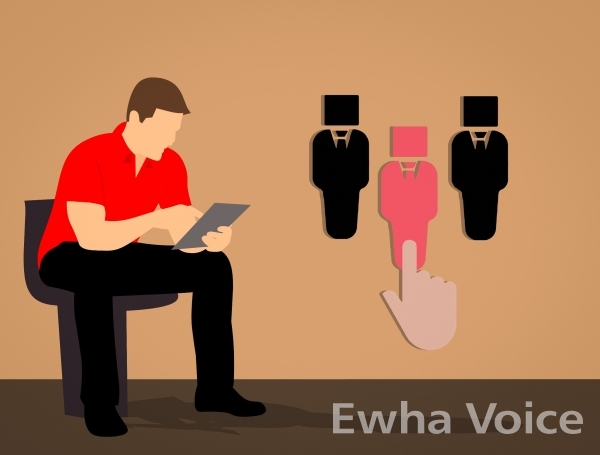
With the increased nationwide awareness and popularity of the Myers-Briggs Type Indicator (MBTI), several companies in South Korea have begun to require MBTI test results from job applicants as part of the hiring process.
Ourhome, a cooking and food company, and Suhyup Bank are two major Korean firms that have included MBTI-related questions in their recent application process. Both companies request applicants to submit their MBTI type and describe its strengths and weaknesses. Additionally, they require applicants to suggest a department within the firm that will best suit their MBTI test results and explain why.
Apart from the above two firms, there were 67 job notices mandating submission of MBTI test results from applicants on Saramin, one of the biggest recruiting platforms in South Korea, as of March 16. While most firms require the applicants to simply state their MBTI type, some showed preference toward applicants with E (Extraversion) personality type. Such hiring practices evoked mixed reactions from professionals and students.
Kim Jae-hyoung, a senior researcher at the Korea MBTI Institute, expressed his concerns about the hiring process requiring applicants’ MBTI test results.
MBTI, according to Kim, is an official psychological testing method used to measure human behavior based on standardized indexes. The test is under the protection of copyright law, but the majority of people in their teens to thirties in Korea use an unauthorized MBTI test that is available online. This indicates that most of the MBTI results that companies will receive from applicants are neither official nor reliable.
Even if some applicants take the official MBTI test, Kim doubted whether the hiring managers and interviewers have the ability to interpret each type of MBTI personality correctly. He explained that only licensed professionals who took courses at the MBTI institute are qualified to interpret MBTI test results and advise the examinees.
Kim also warned of the dangers favoring certain personality types from MBTI test results as he learned about a firm that has rejected applicants with ENTJ, ESFJ, INFP, INTP, and INTJ personality types. He emphasized that there is no hierarchy among MBTI personality types, and all 16 results are spread out horizontally.
"Isabel Myers Briggs, the creator of MBTI personality indicators, worried if the indexes would someday serve as a stigma to people some 80 years ago,” Kim said. “We can all see that her concern has become a reality in present-day Korea.”
A freshman in the College of Business Administration who wished to remain anonymous, admits it is amusing to learn about people’s personalities through MBTI tests. However, she warns that it is practically impossible to divide every unique person into merely 16 types of personalities.
Based on this perspective, she believes MBTI tests should be considered a form of entertainment rather than a serious criterion in employment assessment.
“I think this is a matter of companies misreading the MBTI trend. I do understand that they are trying to take the public’s interests into consideration as it is a hot topic these days,” she said. “However, it can become a tricky matter if you take a light-hearted activity and draw it into a serious-minded process.”
The student fears it would become a lose-lose situation for both the firm and the applicants. People would be robbed of their chances at getting a job before even applying for it and eventually fall down the rabbit hole of endless questions as to whether they have poor personality traits. Companies on the other hand, might be risking their opportunities at finding the right applicant for the position and harming their reputation due to the ensuing controversy.
If, in the near future, her dream job happens to prefer an MBTI personality type different from her own, she intends to try her best to show that she has the right attributes for the position regardless of her MBTI test results.
She also believes that even without the expected MBTI, people can be eligible for a job and that also, the other way around, a certain personality type might not always guarantee the attributes the company is looking for.
“I have witnessed several instances of people with an I (Introversion) that behave like an E and vice versa, people with an E that are not so outgoing or confident,” she said. “So can we affirm that MBTIs are reliable?”

